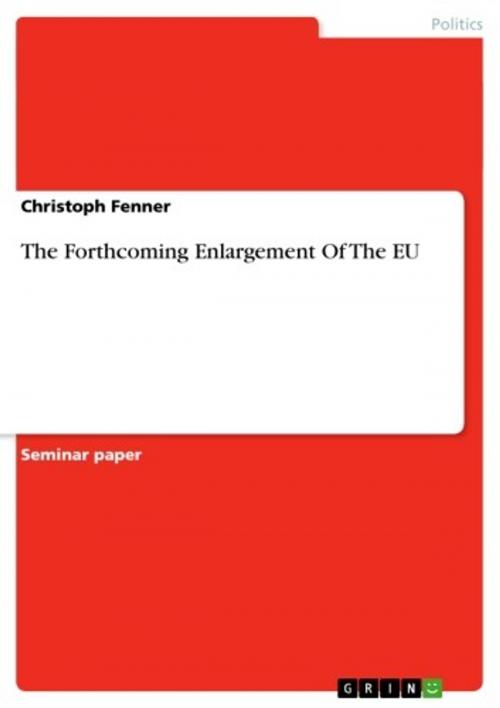The Forthcoming Enlargement Of The EU
Nonfiction, Social & Cultural Studies, Political Science, International, International Relations| Author: | Christoph Fenner | ISBN: | 9783638311649 |
| Publisher: | GRIN Publishing | Publication: | October 5, 2004 |
| Imprint: | GRIN Publishing | Language: | English |
| Author: | Christoph Fenner |
| ISBN: | 9783638311649 |
| Publisher: | GRIN Publishing |
| Publication: | October 5, 2004 |
| Imprint: | GRIN Publishing |
| Language: | English |
Seminar paper from the year 2001 in the subject Politics - International Politics - Region: Eastern Europe, grade: 1-2 (A-B), University of Freiburg (Political Economy), course: Seminar - Eastward Expansion, 21 entries in the bibliography, language: English, abstract: In the last years we lived to see the development of the European Union in political and - above all - in the economical and financial areas. The SEM, the Treaties of Maastricht and Amsterdam, the Single European Currency,... were joint steps to a better, more common and more human Europe; in mediating the global economy, European policymakers operate simultaneously in the Community, in national and local policy environments. But coevally some problems became bigger: problems of a bureaucratically kind, of legitimacy and of obscurity, for which the intellect of a single normal human could not be enough. With the 'Agenda 2000'-Settings the member-states decided to enforce the enlargement of the EU, especially up to the east. But this step can cause difficulties, which are far beyond purely market problems. Before the impending enlargement can come, a lot of questions have to be asked and solved. One point of view concerns the ethnology, sociology and psychology as much as the politics: the search for a common European identity. It should be asked, if there exists or can exist such a common one, or if it is such an empty phrase, used by nationalist and opponents of the EU as well as by the advocators of a 'house of Europe'. I would like to turn my attention to the Hungarian country as an example for the enlargement of the EU. Why Hungary? The European identity of the Hungarian people is deeply included within their national identity: 1. This country belongs to the more favoured group of applicant states listed in Agenda 2000, and always has possessed strong connections to the membercountries, 2. The people in this country share a common history, especially with Austria and Germany (as members of the recent EU), 3. They see themselves as the 'Middle of Europe' - not only in a geographical way. But when we in the western part of Europe speak about this continent and this corpus europaeicum, we often forget to remember, that most of the post-communist countries of course had been an important part of Europe2 and that they share a lot of cultural, religious,... aspects with us, which could be displaced by the iron curtain only temporary.
Seminar paper from the year 2001 in the subject Politics - International Politics - Region: Eastern Europe, grade: 1-2 (A-B), University of Freiburg (Political Economy), course: Seminar - Eastward Expansion, 21 entries in the bibliography, language: English, abstract: In the last years we lived to see the development of the European Union in political and - above all - in the economical and financial areas. The SEM, the Treaties of Maastricht and Amsterdam, the Single European Currency,... were joint steps to a better, more common and more human Europe; in mediating the global economy, European policymakers operate simultaneously in the Community, in national and local policy environments. But coevally some problems became bigger: problems of a bureaucratically kind, of legitimacy and of obscurity, for which the intellect of a single normal human could not be enough. With the 'Agenda 2000'-Settings the member-states decided to enforce the enlargement of the EU, especially up to the east. But this step can cause difficulties, which are far beyond purely market problems. Before the impending enlargement can come, a lot of questions have to be asked and solved. One point of view concerns the ethnology, sociology and psychology as much as the politics: the search for a common European identity. It should be asked, if there exists or can exist such a common one, or if it is such an empty phrase, used by nationalist and opponents of the EU as well as by the advocators of a 'house of Europe'. I would like to turn my attention to the Hungarian country as an example for the enlargement of the EU. Why Hungary? The European identity of the Hungarian people is deeply included within their national identity: 1. This country belongs to the more favoured group of applicant states listed in Agenda 2000, and always has possessed strong connections to the membercountries, 2. The people in this country share a common history, especially with Austria and Germany (as members of the recent EU), 3. They see themselves as the 'Middle of Europe' - not only in a geographical way. But when we in the western part of Europe speak about this continent and this corpus europaeicum, we often forget to remember, that most of the post-communist countries of course had been an important part of Europe2 and that they share a lot of cultural, religious,... aspects with us, which could be displaced by the iron curtain only temporary.















